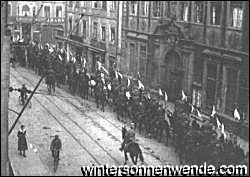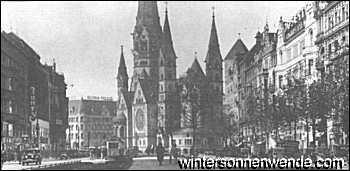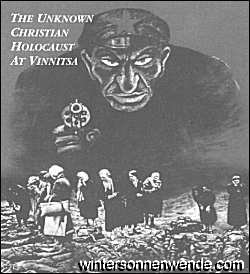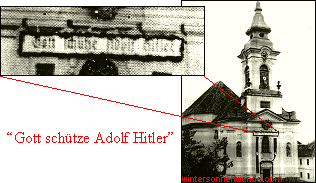|
The National Socialist Stand on Christianity
Article from The
Barnes Review, Nov./Dec. 1999, p. 55-57.
With a supplement added by The Scriptorium:
An oft-repeated canard suggests the German National Socialists were hostile to Christianity. Entire books, such as John S. Conway's The Nazi Persecution of the Churches, 1933-1946,1 have been written to explicate this myth. However, nothing could be further from the truth. Adolf Hitler and many of his supporters were friendly to the Christian churches and their cause. The National Socialist Party program, officially published in February 1920, included a section on Christianity. Point 24 of the 25-point program stated:
The statement was carefully crafted, reflecting the general National Socialist principle of non-interference in church matters. While refusing to endorse any particular Christian denomination or doctrinal perspective, it clearly endorsed "Positive Christianity" and religious freedom. Churches in a National Socialist-dominated German state would be free to fulfill their missions, as long as they did not threaten civil order or national security, or advance beliefs and causes that violated historic German ethics and morals. Certainly not all National Socialists shared this view. Within the party were two powerful forces. One, represented by men like Alfred Rosenberg (who later became Reichsminister for the Occupied Eastern Regions), wanted to see Germany become an atheistic state. The other, represented by men like Hanns Kerrl (who later became Reichsminister for Church Affairs), endorsed Christianity. But it was Kerrl, not Rosenberg, who was in the majority. In recognition of the party's partnership with churches in its effort to remake Germany, storm troopers were required to attend worship services in their uniforms. Although Hitler made no profession of faith, he refused to identify himself with the anti-Christian views of some of his associates, such as Rosenberg. In addition, he frequently made mention of "the Almighty" and 'Providence" in his speeches, as well as attacking two of Christianity's opposites: Marxism and atheism. The National Socialists showed no direct interest in either theological matters nor those issues they considered relevant only to the internal life of the church. In 1938, therefore, the National Socialists rightfully could boast that they had not interfered in the religious life of the churches:
In 1935, an article in a National Socialist publication made clear the distinction between what was "political", and what was "religious". According to the author:
Because of their commitment to a strict separation of church and state, the National Socialists insisted that churches should play no active part in the political developments of the Reich. As long as the churches confined themselves to religious matters, their freedom was guaranteed.
To the majority of the Protestant clergy and laity, the National Socialist call for the separation of religion and politics was neither new nor unwelcome. It was something that was basic to the Lutheran tradition of "the Separate Kingdoms" - one earthly, and the other heavenly.6 Jesus's call to "render to Caesar what is Caesar's and to God what is God's" historically had been interpreted as meaning a separation between politics (Caesar) and religion (God). At the beginning of 1932, there were 28 provincial Protestant churches in Germany, all with similar patterns of organization. They were all headed either by bishops or superintendents with synods serving as their governing bodies. They were all independent of political government control.
Disillusioned by the economic crisis of the Great Depression, many Germans left the church, especially between 1930 and 1933. With Hitler's rise to power, however, this trend was reversed. National Socialist encouragement for and friendliness toward Christian faith found ready and receptive ears in German communities, leading to revival in the churches.10 The presence of leading National Socialist members at church services and Hitler's attacks on "godless Marxism", "Jewish materialism," and decaying morality, together with the government's call for the exercise of authority and leadership and the renewal of morals, provided clear evidence to average Germans that the National Socialists were pro-Christian - so much so, in fact, that the year 1933 became known as "The Year of the Church."11
 Notes:
1John S. Conway, The Nazi
Persecution of the
Churches, 1933-1945 (London: Weidenfeld and Nicolson, 1968).
...back...
2Alfred Rosenberg, editor, Das Parteiprogramm:
Wesen, Grundsätze und Ziele der NSDAP, 21. Aufl. (Munich: Parteidruckerei, 1941),
p. 15. ...back...
3Walther Hofer, Nationalsozialismus.
Dokumente, 1933-1945 (Frankfurt/Main: Fischer Taschenbuch, 1961), p. 133. ...back...
4"Positives Christentum," Wille und Macht
(April 15, 1935). ...back...
5Hofer, op.cit. (Note 3), p. 136. ...back...
6For a thorough discussion of Martin Luther's
theology, including this aspect, see Alister E. McGrath, Christian Theology: An
Introduction (Oxford: Blackwell, 1994),
pp. 55-75. ...back...
7Martin Broszat, Der Staat Hitlers (Munich:
Deutscher Taschenbuch-Verlag, 1969), p. 285. ...back...
8A. J. Ryder, Twentieth-Century Germany: From
Bismarck to Brandt (New York: Columbia UP, 1973), p. 281. ...back...
9Quoted in: Paul F. Douglas, God Among the
Germans (Philadelphia: U Pennsylvania
P., 1935), pp. 81-82. ...back...
10Broszat, op.cit. (Note 7), p. 286. ...back...
11Friedrich Zipfel, Kirchenkampf in Deutschland,
1933-1945: Statistiken für Berlin (Berlin: Walter de Gruyter, 1965), p. 18. ...back...
 Supplement by The
Scriptorium:
Hitler and the Church
Adolf Hitler's Speech of January 30, 1939
Excerpt from: Max Domarus, Hitler - Reden und Proklamationen
1932-1945, p. 1058. "The accusations which the so-called democratic nations raise against Germany also include the allegation that National Socialist Germany is a state that is hostile to religion. To this charge I wish to declare solemnly, before the entire German people: 1. In Germany no-one has been persecuted for his religious convictions to date, nor will anyone be persecuted for them. 2. Since January 30, 1933 the National Socialist state, acting through its official organs, has put the following public tax revenue at the disposal of the two Churches:
during fiscal year 1934: 170 million RM, during fiscal year 1935: 250 million RM, during fiscal year 1936: 320 million RM, during fiscal year 1937: 400 million RM, during fiscal year 1938: 500 million RM. Added to this are an annual 85 million Reichsmark from Land [i.e. state or provincial, trans.] tax revenues and some 7 million Reichsmark from the local tax revenues from municipalities and municipal associations.
Added to this are the countless donations, testamentary transferences and, most of all, the revenues from Church collections. What is more, in the National Socialist state the Churches enjoy various tax concessions, and where donations, bequests etc. are concerned they are entirely exempt from taxation. It is therefore the height of impertinence - to put it mildly - that politicians, especially from abroad, presume to allege that the Third Reich is hostile to religion. If the German churches should really regard this situation as intolerable, then the National Socialist state is ready and willing at any time to institute a clear division of Church and state, such as is the case in France, America and other countries. I would like to ask: what sums from public revenues have the administrations of France, England or the United States put at the disposal of their churches during the same period of time?
However: clergy who believe that they see their mission not in being the servants of God but rather in slandering our present state, its institutions or its leaders, will find themselves sternly reminded by the National Socialist state that a destruction of this state will be tolerated by no-one, and that if they step outside the bounds of the law, members of the clergy will be held just as accountable for their actions under the law as any other German citizen. It is necessary here to stress that there are tens of thousands of clergymen of all Christian denominations who, without ever coming into conflict with the laws of the state, do equal or perhaps even better justice to their ecclesiastical duties than do those of their brethren who act as political agitators. The state regards it as its duty to extend its protection to the former; its duty is the eradication of enemies of the state. 4. The National Socialist state is neither prudish nor dishonest. But there are certain moral principles, adherence to which is in the interest of the biological health of a people and which we therefore will not permit to be undercut. Pederasty and crimes against children are punished as criminal offenses in this state, regardless who commits these crimes. Five years ago, when some leading figures in the National Socialist Party committed these crimes, they were executed. When other public or private individuals, or clergymen, commit the same offenses, they are punished with jail or prison terms. We take no interest in clergymen's transgressions against their other vows of chastity etc., and our media has never published anything on this subject. In other respects, this state has intervened in the internal order of the Churches only once, namely in 1933, when I myself attempted to unite the weak and divided Protestant Land churches in Germany into one large and powerful Protestant national Church. This attempt failed due to the resistance of individual Land bishops. And accordingly, the attempt was then abandoned; for after all it is not our task to forcibly defend the Protestant Church against its own representatives, or to strengthen it against its will. Now, if foreign countries and particularly certain democratic statesmen speak up so strongly for individual German priests, the reason can only be a political one. For these same statesmen remained silent when hundreds of thousands of clergy were massacred or burned in Russia; and they remained silent when tens of thousands of priests and nuns were brutally butchered or burned alive in Spain. They could not deny these facts, but they remained and continue to remain silent, while - and I cannot but point this out to the democratic statesmen - these massacres prompted numerous National Socialists and Fascists to put themselves voluntarily at General Franco's disposal in order to help prevent this Bolshevist blood frenzy from being spread further across Europe and thus from being visited upon the majority of civilized humankind. [...] It was the concern for European culture and for true civilization that prompted Germany to side with nationalist Spain in its battle against its Bolshevist destroyers. It is a sad indicator of the mentality prevailing in various countries, that taking action for such unselfish motives seems to be inconceivable there. But National Socialist Germany participated in General Franco's revolt solely with the sincere wish that he might succeed in saving his country from a danger which Germany herself once almost succumbed to. Therefore, sympathy or pity for persecuted servants of God cannot be what prompted the democratic citizens' interest in individual clergymen who have come into conflict with the law in Germany. Rather, it is the interest in the enemy of the German state. In this regard, it is important to note: the German priest acting as servant of God enjoys our protection, but the priest acting as political enemy of the German Reich will be rooted out. We believe that this is the best way to prevent a development which - as experience has shown in the case of Spain - may otherwise necessitate countermeasures of unforeseeable extent in the future. In this context I wish to state as a matter of principle: Certain circles abroad seem to believe that the especially vociferous declaration of sympathy for elements which have come into conflict with the law in Germany could effect a relief of their situation. There is perhaps the expectation that certain journalistic measures in this regard may serve to exert a terrorist influence on the German state leadership. This belief is founded on a capital error. To us, the support which circles abroad lend to certain efforts directed against the German state is the final proof of their treasonous nature! For mere opposition to a regime has never yet drawn sympathy from these foreign democracies, and neither has the prosecution or punishment of a political offender. When has Germany ever had a stronger political opposition than the National Socialist one? Never has a political opposition been suppressed, persecuted and incited against with baser means than the National Socialist Party was. It is to our credit that we can say that we have never enjoyed the pity, much less the support, of such a foreign power for such a reason. Therefore, this kind of support seems to be reserved for those whose aim it is to destroy the German Reich. And for this reason, each and every instance of it only serves as one more compelling reason for us to tighten our measures [...]."

The National Socialist Stand on Christianity & Hitler and the Church |









